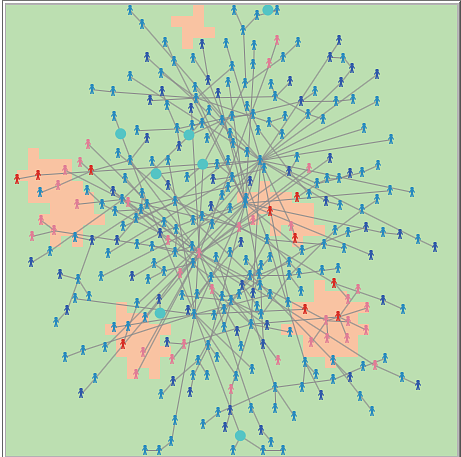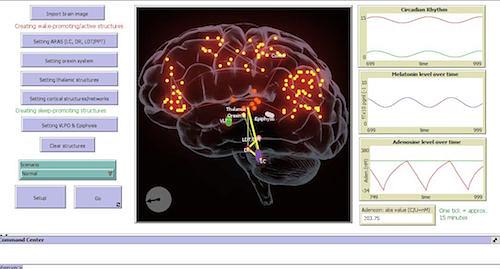
- 18 Oct 2017
The second run of Bill Rand’s fabulous MOOC, Introduction to Agent-based Modeling, wrapped up September 7th, 2017. If you haven’t taken this MOOC, you might not know that it not only introduces you to agent-based modeling and how to use it to carry out research in different complexity-related fields – the course also guides you through creating your own agent-based model in NetLogo.
At the end of the course, students submit their projects and then turn around and review each others’ work. Agent-based modeling is a truly trans-disciplinary tool, so the breadth of subjects covered by the students’ projects is impressive.
Some of the students who completed a project for the course have bravely made their projects public. Scroll down to the bottom of this article for the full list. Read a little bit more for some insight into some of the students completing the 2017 Agent-based Modeling course.
“Dr. Bill Rand is an excellent instructor. His enthusiasm for the subject was obvious in spite of being limited to pre-recorded lectures. He covered a wide range of examples and the course was ideal for students with diverse interests.” – Erik Scully, USA.
Kjirste Morrell’s project on correcting false information received a score of 100% in the course – a truly impressive feat for a peer-reviewed project! She is an engineer living in the U.S. who found the course after hearing about agent-based modeling in a book she was reading. She persevered through the course despite a long vacation away from the internet and a busy stretch towards the end. Bill Rand’s engagement with the class, his very human style, the moderate pacing of the videos with demonstrations of model building and in particular the model created in Unit 4 were highlights for her. Her final model illustrated factors that affect the correction of false information in social networks. Go ahead and play with the model, it’s especially interesting in today’s “fake news” climate. Check the media bias setting and see how pockets of the network do not adopt the correction of false information. Lucky for everyone, she’s continuing her work with the model, adding in validation and analysis. Look out for future models on geopolitical forecasting as well.
“The feedback from instructor and peers was particularly useful, because it pointed out some specificities, or problems in the model, that I did not see or think about. It was important to add all the necessary corrections or improvements.” Aymeric Vié, Italy.
Vinicius Marino Carvalho did so well on his project modeling 13th century Ireland politics that he ended up presenting his model at a conference in Santiago de Compostela: Humanidades Dixitales: Olladas Cara á Idade Media (October 2017). It was very well received there, just as it was by students of the ABM 2017 MOOC session.
 Vinicius is a Brazilian PhD student who had no prior programming experience before this course, and the prospect of coding was a little scary. He had decided he needed to use ABM in his doctoral research and Bill Rand’s course provided the correct scope and pace to guide him through creating his first models and finally modeling his own research. Despite his initial fears, he found that remaining motivated throughout the course was easy due to the forgiving pace combined with challenging lessons that kept his interest alive. Vinicius modeled Irish and English landholders who may choose to build alliances, wage wars against other landholders, and help their allies in battle. His model doesn’t resemble any of the models he studied during the course, so it was especially challenging for him to create his model. He was proactive searching the NetLogo glossary and Stack Overflow to find solutions to his programming problems. However, he said the lessons about agentsets, breeds and plotting were all crucial to his model. Interact with the model here.
Vinicius is a Brazilian PhD student who had no prior programming experience before this course, and the prospect of coding was a little scary. He had decided he needed to use ABM in his doctoral research and Bill Rand’s course provided the correct scope and pace to guide him through creating his first models and finally modeling his own research. Despite his initial fears, he found that remaining motivated throughout the course was easy due to the forgiving pace combined with challenging lessons that kept his interest alive. Vinicius modeled Irish and English landholders who may choose to build alliances, wage wars against other landholders, and help their allies in battle. His model doesn’t resemble any of the models he studied during the course, so it was especially challenging for him to create his model. He was proactive searching the NetLogo glossary and Stack Overflow to find solutions to his programming problems. However, he said the lessons about agentsets, breeds and plotting were all crucial to his model. Interact with the model here.“I’m a Doctoral Student about to kick off my dissertation project. I’ve returned to school after 20 years in the corporate world. Most of the problems I’ve worked with professionally have been non-linear and involve systems with feedback loops and evolve over time making Complexity Science very attractive. The types of problems I’m interested in researching have outputs at a higher level of analysis than the units of analysis I can experiment with. The course did a great job providing an accepted methodology to collect data with traditional methods to calibrate an ABM. This way I can experiment at a level not normally accessible without Complexity Science.“ Sean Dougherty, USA.
A selection of final projects submitted by students of the 2017 Agent-based modeling course:
- Financial incentives for walking on escalators: London Underground Escalators System by Muhammad Hijazy
- Behavioral preferences in isopods: Isopod Box Simple by Erik Scully
- Voting models: Generalized Urn Model with Triggering by Paul Matthews
- Supply chains: Collaborative demand forecasting by Valentas Gruzauskas
- Delay and media effects in social networks: Correcting Information – delay and media effects by Kjirste Morrell

- Public transportation driving prestige-purchase behavior: Social Inequity in Transportation System by Gillmar Betara
- Geographical effects of news-sharing: Spatial-Social Interactions by Sean Dougherty
- Associations and activities: Crowding Out by Jorge Martinez
- Tipping point for the spread of ideas: Minority belief spread by Thouraya Bchir
- Livestock grazing: Grazing by Anemone Cerridwen
- Highway effect on mountain lions: Santa Monica Mountains Mountain Lions by Pete Anniello
- Blood sharing in bats: Reciprocal altruism in vampire bats by Collin Lysford
- Medical models: Pulmonary edemas & Sleep wake regulation by Victor Iapascurta
- Tax and labor: Taxation policy and economic market by Aymeric Vié
- 13th century Irish and English local politics: Irish and English by Vinicius Marino Carvalho
“I have a mathematical background and started studying operation research in logistics. I was looking for a course, which could help me learn more social science analysis methods such as ABM. I wanted to participate in a summer school, but it turned out that I found a great summer course online, which provided even more information than a regular summer school could.” Valentas Gruzauskas, Lithuania.
